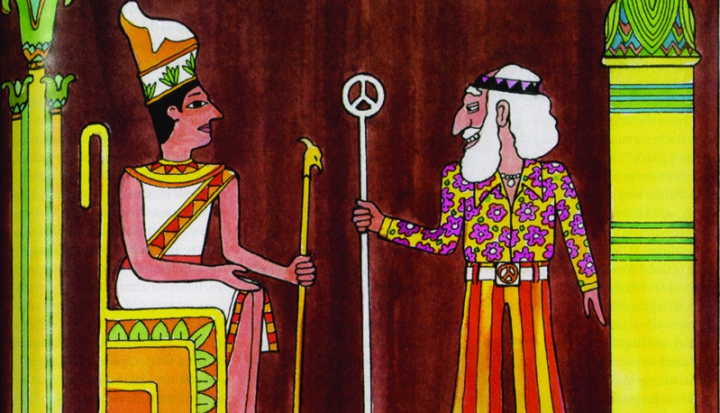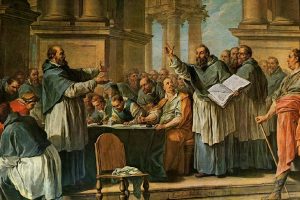This essay appeared in the February 2000 issue of U.S. Catholic (Vol. 65, No. 2, pages 18–21).
I remember the day well. I stood with my classmates in the St. John of the Cross gymnasium, and I was dressed in the height of early ’70s fashion: blue blazer, big maroon tie, extremely groovy white pants, and, bringing the outfit to completeness, orange round-toed platform shoes. As we waited to receive our eighth-grade diplomas from the hands of Father Bennett, our pastor, cultural forces were swirling around us that would, willy-nilly, shape our consciousness and affect the way we would see the world and relate to our faith. We graduates of the class of ’73 were not children of the serene and prosperous ’50s, nor of the idealistic and revolutionary ’60s; no, we were to come of age in the riven and ambiguous ’70s.
Just a few months before our graduation, American military involvement in Vietnam came to an end, only to be followed two years later by the collapse of the Saigon government that we had striven so mightily and for so long to defend, even at the cost of 58,000 American lives. Whether viewed from the left, center, or right, this public policy came to be judged as a colossal failure, and its shadow was to fall across the whole decade.
The summer after graduation, I sat in our family room watching, with a combination of fascination and incomprehension, the Watergate hearings that seemed to play every day on every channel. My earliest political memories and experiences center around the names John Dean, H.R. Haldeman, John Ehrlichmann, Jeb Stuart Magruder, and Charles Colson. As my parents endeavored to explain to me the contours of the Watergate phenomenon that summer, many of my convictions concerning politicians, public institutions, and political rhetoric were being subtly shaped. And, of course, those convictions were only solidified when, the following August, the president, having lost the support of his own party, resigned his office amidst scandal and disgrace.
During our eighth-grade year, we were each obliged to present an autobiography. I told my life story, such as it was, and at the end of my reflections I shared with the class my vocational aspiration: to be president of the United States. My teacher, Sister Lorraine, told me that it was an admirable career goal, and then she posed the question, “Bob, who are your political heroes today?” I had nothing to say; I was stumped. This was surely due in part to youthful naiveté, but it was also a sign that the ’70s was not an era of heroes.
If one surveys the popular culture of that period. One notices the early films of Martin Scorsese and Francis Ford Coppola, movies like Mean Streets, The Godfather, and The Conversation, explorations of the seamy underside of American life. The main players in these films were not the morally upright protagonists of an earlier era; they were antiheroes, played by the likes of Gene Hackman, Dustin Hoffman, and especially Jack Nicholson. They were characters divided against themselves, morally ambiguous, noble precisely in their most nefarious moments. If we wanted to find clear heroes and clear villains, we had to go to a “galaxy far far away”: Star Wars came out when we were seniors in high school.
The first presidential election my classmates and I voted in was in 1980. The nation was just recovering from the oil embargoes and gas shortages of the mid ’70s, inflation was out of control, unemployment was skyrocketing. Responsible people were speaking of the breakdown of the American economy, and President Jimmy Carter was alluding to a malaise settling over our society. Not a time of optimism and confidence.
And what was our experience of the church? Those of us who graduated from grade school in 1973 began our Catholic education in 1965, the year the Second Vatican Council ended. What we moved into, accordingly, was not the confident church of the ’50s or the heady revolutionary church of the conciliar period, but the confused and confusing church of the post-conciliar era.
I have often referred to mine as a lost generation with regard to things Catholic. Quite frankly, our teachers didn’t know what to tell us. They knew that the old had been placed into question, but the new had not yet arrived, and thus instead of biblical narratives or church doctrine we were treated to banners and collages and political slogans.
I remember once in sixth grade our religious teacher, a nun, invited us to listen to James Taylor’s “You’ve Got a Friend” and then, with our eyes closed, to draw the feelings that the song evoked. In seventh grade, we all labored mightily to make a banner featuring outlines of our hands and the superscript, “We are building the kingdom of God.” We were, of course, oblivious to the sheer Pelagianism of the motto.
A telling detail: Our performance in courses such as math, science, history, and English were evaluated with a traditional letter grade, while our progress in “less serious” disciplines such as art, music, and P.E. was traced with “checks,” a kind of pass-fail designation; we received checks, not grades, in religion. That the faith could be studied as a serious academic enterprise obviously struck our teachers as unlikely.
Sermons in the ’70s revealed the inner struggles and questions of the preacher far more than the saving grace of God. When writers from an older generation speak of the fire-and-brimstone Catholic preachers and missionaries who imposed a clear-cut doctrine and brooked no opposition, I can only smile. Amidst all of the agonized self-searching of the preachers of my generation, I would have appreciated a little fire and brimstone, if only for the sake of novelty.
As a result of all of this, most of my classmates are a bit at sea when it comes to a Catholic sense of scripture, dogma, liturgy, and church history. Many of them have today drifted into other expressions of Christianity or into a vague sense of secularism. There developed in many of us a conviction, for the most part unconscious, that the church—tentative, vacillating, often simply an echo of the culture—had little to tell us. And if one looked honestly at church life in the ’70s, one saw priests and nuns leaving active ministry in droves, Mass attendance plummeting, and a sort of ecclesial “malaise” that mirrored the cultural one Jimmy Carter described.
What did all of this mean for the graduates of the class of 1973? It meant that we grew up a bit canny, wary, skeptical, even a bit cynical. The grand cultural institutions that had supported and given meaning to our parents’ lives seemed to rest on shaky foundations, and we were reluctant to entrust ourselves to them. We developed, to use the current academic jargon, a strong hermeneutic of suspicion.
But this skepticism, this suspicion of the world, has also opened us, I would argue, to the surprising, discontinuous narratives of scripture. Oddly, the Bible is a book especially well-suited to children of the ’70s.
If we survey the Bible from Genesis to Revelation, we find story after story about the disaster that follows from an over-reliance upon human ideas, leaders, and institutions. The pattern is set in the story of rebellion in the Garden of Eden and in the still disturbing account of the building of the Tower of Babel. When we, through our efforts and achievements, hope to storm heaven and claim for ourselves a share of divinity, we inevitably fail.
If we peruse the books of the prophets Isaiah, Ezekiel, Jeremiah, Amos, and Daniel, we find repeated condemnations of kings who put themselves above the law, of political policies based on greed and violence, and of cultural institutions that rest on the oppression of the poor.
If we look to these same prophetic figures, we encounter some of the bitterest critiques of ineffectual religion ever written. Isaiah, for examples, gives voice to the passionate anger of God at a religion that has lost its soul: “What are your endless sacrifices to me? I am sick of holocausts of rams and the fat of calves. Bring me your worthless offerings no more, the smoke of them fills me with disgust.”
The vitriol of the Old Testament prophets seems as nothing when compared with the fire of Jesus’ own words against the political and religious establishment of his time: “You scribes and Pharisees, you frauds . . . You are whitewashed sepulchers, all impressive on the outside but on the inside full of filth and dead men’s bones.”
Something tells me that those of us who came of age in the post-Vietnam and post-Watergate period understand the spiritual import of these stories and saying only too well. We who grew up in the era of “malaise,” both social and religious, can comfortably inhabit the space opened up by these texts.
There is little in the Bible of the mythological tendency to glorify of idealize human beings. The main characters of the biblical narratives are, for the most part, antiheroes, figures as riven and ambiguous as any Jack Nicholson character.
We find Moses, the liberator of his people and the one who was petrified to speak before Pharaoh; we have Jacob, who bore the promise and who also stole his birthright from his brother and then had to wrestle with God; we read of David, the great king and the contemptible murderer of Uriah the Hittite; we hear of Jeremiah, who was summoned by God and who was overwhelmed by a sense of his own unworthiness; we meet Peter, the rock upon whom Christ would build his church and the scoundrel who denied his master in his moment of greatest need.
And which Scorsese character speaks this line: “I cannot understand my own behavior. I fail to carry out the things I want to do, and I find myself doing the very things I hate. . . . What a wretched man am I! Who will rescue me from the body doomed to death?” It is, of course, the apostle Paul speaking to the tiny Christian community gathered in Rome.
The biblical authors labor under no illusions about human beings. In fact, there is probably no document in Western literature that describes humans with more brutal honesty than scripture. Our clay feet, our ambiguous motives, our split consciousness, the debilitating anxiety that shadows even our most confident projects—all of it is laid bare by the great revelation texts.
The reason for this is once again clear. The biblical authors insist, in season and out, that as long as we rest our lives on our own egos, we will never find joy. Only when we can say with Paul, “It is no longer I who live, but Christ who lives in me,” can we experience liberation. Only when we know in our bones that our lives are not about us, only when we acknowledge that there is a “power at work in us that can do infinitely more than we can ask or imagine,” can we be saved.
What the Bible proposes over and again as a means to this realization is the spiritual exercise of coming to terms with our own weakness, debility, insufficiency. This is designed, of course, not to depress us, but to “de-center” us and thus to free us. When we rest on ourselves and our own ego accomplishments, we live in what the spirit masters call the pusilla anima, the little soul, the soul precisely as wide as the contours of the ego. But when we are rooted, not in ourselves but in the divine power that animates the cosmos, we live in the magna anima, the great soul, whose breadth is measureless.
The problem with heroes is that they get lured so easily into the “little soul”; the advantage that antiheroes enjoy as they stand amidst the ruins of their egos is that they are opened to the “great soul.” Maybe we children of the ’70s, so skeptical of our “heroes,” are particularly apt to get this message.
Does all of this mean that the biblical authors have given up on the human race, have become simply pessimistic about human institutions and achievements? Not really. It just means that they refuse to put their faith in them.
Faith, in a scriptural context, means ultimate trust. To pose the question about faith is to wonder where we finally anchor our lives, where we, in the last analysis, “stand,” where we, at the end of the day, orient our lives. When the ego’s works are riven, shaken, turned upside down, we tend to lose “faith” in them, and this, from a biblical standpoint, is all to the good, for we are not designed to root ourselves in something as vacillating and tiny as the ego. We are meant to put our final trust in that strange, awesome, and enticing power that infinitely transcends who we are and what we can do.
In Luke’s gospel, Jesus says, “Get yourselves purses that do not wear out, treasure that will not fail you in heaven where no thief can reach it and no moth destroy it.” Any “purse” or treasure of this world—any ideal, movement, institution, or person here below—will wear out, will prove unworthy of our final confidence. “Isn’t it the truth?” exclaim the children of the ’70s. “So be it,” say the authors of scripture.
And so, we fellow inheritors of so many broken promises, let us rejoice that in God’s providence we are no liable to succumb to the subtlest of temptations: faith in this world. And then let us not despair; rather, join our soul mates Moses, Isaiah, Jacob, David, Peter, and Paul in the journey of authentic faith, the road to the great soul.
Father Robert Barron gave this sermon at his class’s 25th anniversary celebration.













Add comment